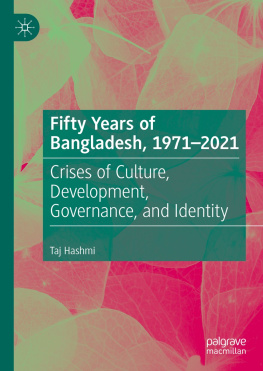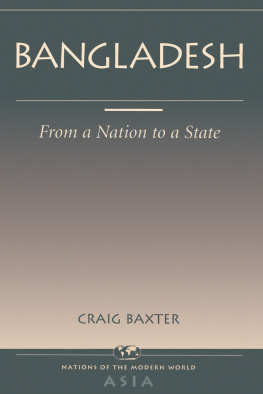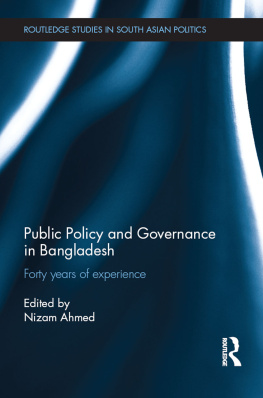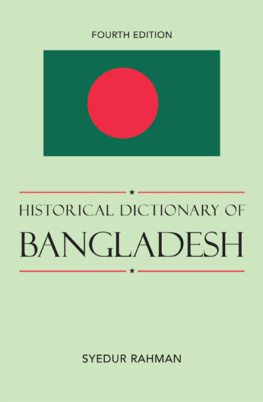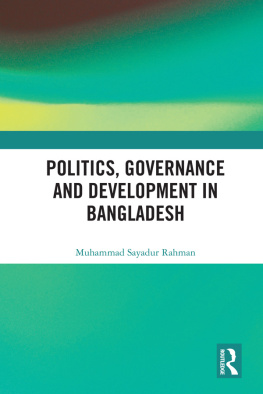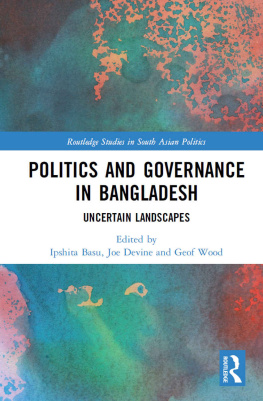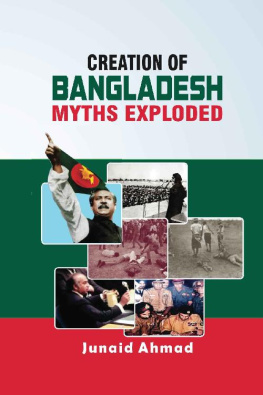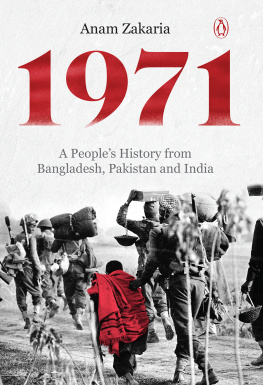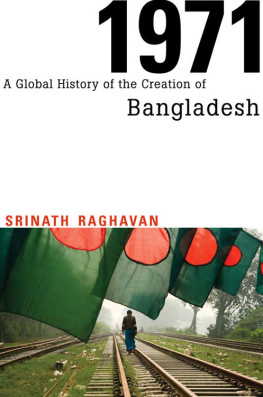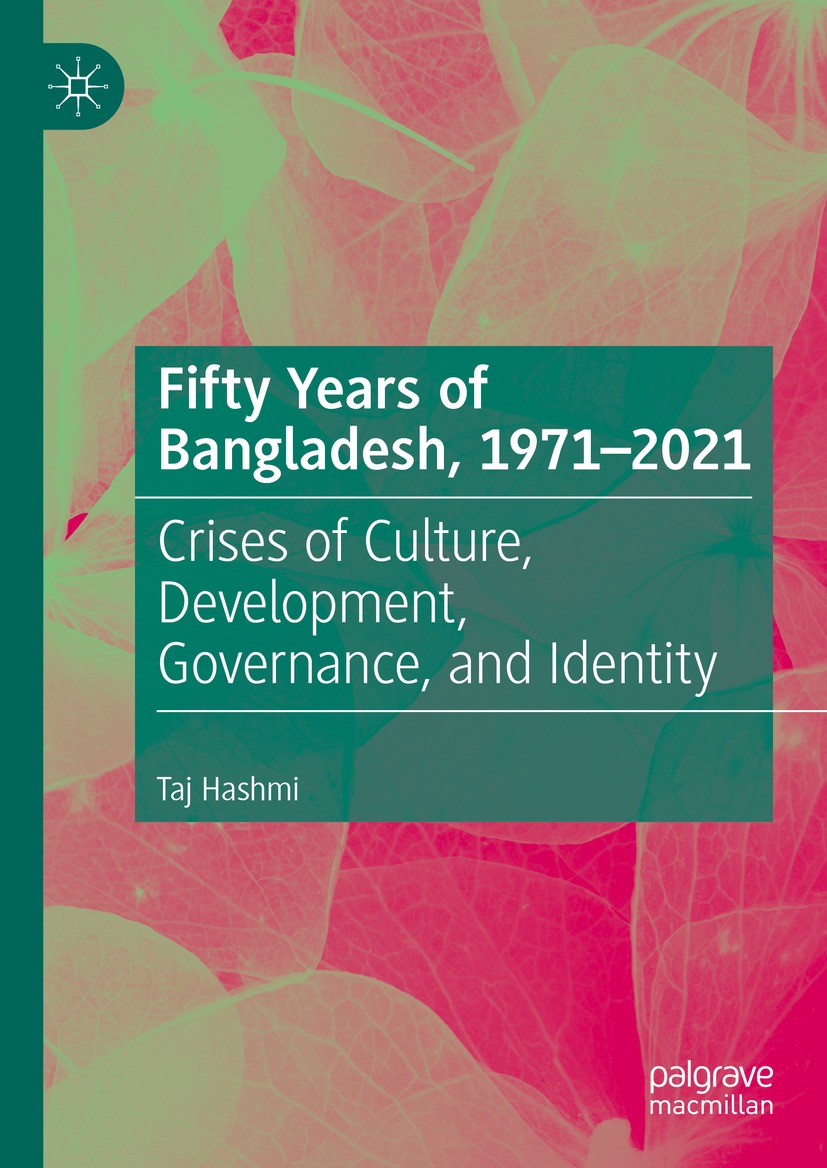Taj Hashmi
Fifty Years of Bangladesh, 19712021
Crises of Culture, Development, Governance, and Identity

Logo of the publisher
Taj Hashmi
Hawaii, HI, USA
ISBN 978-3-030-97157-1 e-ISBN 978-3-030-97158-8
https://doi.org/10.1007/978-3-030-97158-8
The Editor(s) (if applicable) and The Author(s), under exclusive license to Springer Nature Switzerland AG 2022
This work is subject to copyright. All rights are solely and exclusively licensed by the Publisher, whether the whole or part of the material is concerned, specifically the rights of translation, reprinting, reuse of illustrations, recitation, broadcasting, reproduction on microfilms or in any other physical way, and transmission or information storage and retrieval, electronic adaptation, computer software, or by similar or dissimilar methodology now known or hereafter developed.
The use of general descriptive names, registered names, trademarks, service marks, etc. in this publication does not imply, even in the absence of a specific statement, that such names are exempt from the relevant protective laws and regulations and therefore free for general use.
The publisher, the authors and the editors are safe to assume that the advice and information in this book are believed to be true and accurate at the date of publication. Neither the publisher nor the authors or the editors give a warranty, expressed or implied, with respect to the material contained herein or for any errors or omissions that may have been made. The publisher remains neutral with regard to jurisdictional claims in published maps and institutional affiliations.
Cover illustration: Maram_shutterstock.com
This Palgrave Macmillan imprint is published by the registered company Springer Nature Switzerland AG
The registered company address is: Gewerbestrasse 11, 6330 Cham, Switzerland
Fifty Years of Bangladesh, 19712021
As of today, it is the only historical sociology of Bangladesh illustrating the nations culture, development, governance, and identity crises from the perspectives of history, politics, sociology, and cultural anthropology. Excellent work.
Kamal Siddiqui, Former Professor at the IDPM, Manchester University, UK
A must-read book to understand why 50 years after becoming independent, Bangladesh continues to be one of the most fractured countries in the world, its huge economic progress notwithstanding. Taj Hashmi has brilliantly examined the historical, political, economic, social and cultural contexts of Bangladeshs disunity to conclude that it is still dysfunctional.
M. Serajul Islam, Retired Bangladeshi Diplomat, Bangladesh
What a history Bangladesh has had in 50 years! Taj Hashmi captures it all in his beloved homeland! In his pessimism of the intellect and the optimism of the soul he pulls no punches and critiques his sonar Bangla in the starkest terms but he remains optimistic and ever hopeful. In ten brilliantly and exhaustively researched chapters he covers all the nations fault-lines from its booming garment industry to its rural agricultural base, from its history under the Raj to its significant place in the 21st century global economy, from its Bengali and Islamic orientation to its Bangladeshi-Islamic identity, and from its reverence and criticism of its heroes from Pakistans founder Jinnah to Mujeeb and Zia and their descendants to the demographic and environmental catastrophes that beckon. It is thirty years since the erudite, well-travelled, and cosmopolitan Hashmi penned his Pakistan as a Peasant Utopia, and over twenty years since his Women and Islam in Bangladesh. Scholars and the public will recognize and appreciate his frank assessment as much as some will find it challenging and uncomfortable. Everyone will benefit from his forthright comments on the global economy and its social, political, and economic impact: but Culture Matters.
Roger D. Long, Eastern Michigan University, USA
The narrative sweep of this book covers Bangladeshs political culture, development, identity, and governance over the last fifty years of its independence since 1971. This appraisal is reminiscent of Taj Hashmis other recognized social history volumes on South Asia. I recommend this book for the fresh as well as the veteran readers of Bangladesh history.
M. Rashiduzzaman, Professor Emeritus in Political Science at Rowan University, Glassboro, New Jersey, USA
Fazlu, my childhood friend, perished with his entire family in 1971 but saved my life
Preface and Acknowledgements
Freedom and slavery are mental states.M.K. Gandhi
The truth which makes men free is for the most part the truth which men prefer not to hear.Herbert Agar
This study is a sequel to my previous three works on Bangladesh: Ouponibeshik Bangla (Colonial Bengal), Pakistan as a Peasant Utopia and Women and Islam in Bangladesh. Although the stories are different, there are thematic similarities between this study and the previous ones. All of them have in common peasants, peasant culture, discrimination against underdogs and abuse of human rights. The title of this study could be the what-went-wrong-syndrome of Bangladesh. This is a departure from almost all the traditional studies on modern and contemporary Bangladesh. Only a handful of works by scholars like Sarmila Bose and Yasmin Saikia are dispassionate, objective studies on Bangladeshs Liberation War. This myth-buster sheds light on many known and unknown facts about the history, politics, society, and culture of the country. The country is not just another postcolonial counterpart of India, Pakistan or Sri Lanka; Algeria, Indonesia, Nigeria, Singapore or Vietnam. It became independent twice, once in 1947, and then again in 1971.
This historical sociology of Bangladesh is a myth-buster that sheds light on many known and unknown facts about the history, politics, society and culture of the country. Besides being a twice-born countryliberated twice, from the British in 1947 and from West Pakistanis in 1971it is also an artificial entity suffering from acute crises of culture, governance and identity. The author of this study attributes the culture and identity crises to the demographic by-products of bad governance. In addition to being overpopulated, Bangladesh is also resource-poor and has one of the most unskilled populations, largely lumpen elements and peasants. According to Marx , these people represent the unchanging remnants of the past. The second round of independence empowered these lumpen classes, who suffer from an identity crisis and never learn the art of governance. The proliferation of pseudo-history about Liberation has further divided the polity between the two warring tribes who only glorify their respective idols, Mujib and Zia . Pre-political and pre-capitalist peasants/ lumpen elements lack of mutual trust and respect has further plagued Bangladesh, turning it into one of the least governable, corrupt and inefficient countries. It is essential to replace the pre-capitalist order of the country run by multiple lumpen classes with capitalist and inclusive institutions.
Since this work is the first of its kind concerning the country, no single volume on history, politics, cultural anthropology, sociology, development studies and economics is going to be a substitute, let alone a competitor, of this multi-disciplinary study. I have pointed out here as to how the divisive polity of Bangladesh has become a fractured one, fast destabilizing the country beyond ones imagination. Despite the high GDP growth (67 per cent) and the visible improvements in the infrastructure in and around Dhaka (although one rainy day virtually turns the over-populated tiny citys congested roads into waist-deep canals), the bulk of the population have remained poor, uneducated, backward and superstitious, while the country has remained very poor. Fifty years after the Liberation, the country is still among the four least developed countries (LDCs) from South Asia, along with Afghanistan, Bhutan and Nepal, and the forty-six others across the world, mostly from the Sub-Saharan Africa.

